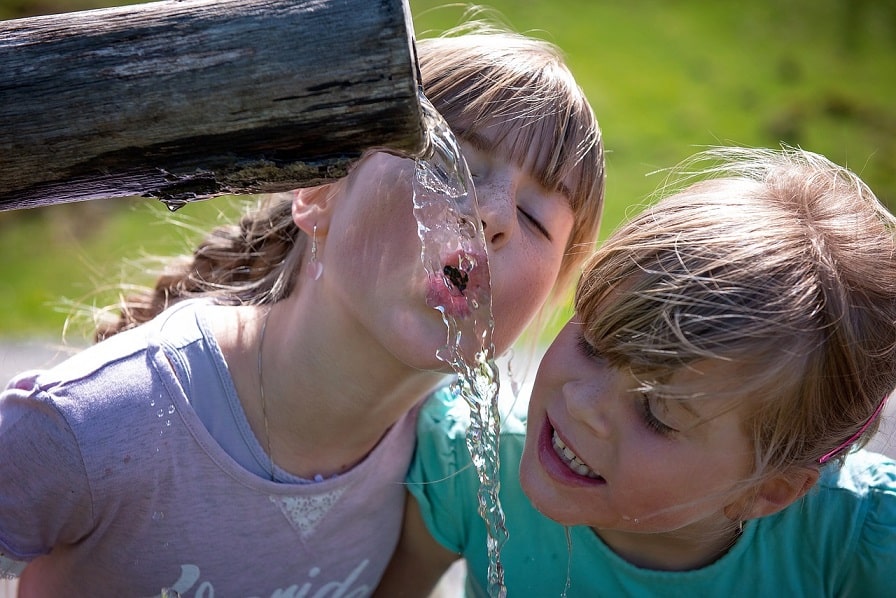Because water is essential to each and every cell in the body and certain processes cannot be carried out without it, it is extremely necessary that we keep the balance of the body’s fluids. Our bodies are composed of around 70 percent water, and it is highly critical that we do so.
Dehydration is a condition that can occur if a person does not consume enough water on a regular basis. Dehydration can cause a variety of unpleasant physical symptoms, such as headaches, dry mouth, dry mucous membranes in the eyes and nose, sore joints, dizziness, heart problems, kidney problems, and other health issues.
Because water is also essential to the process of growing, it is even more vital for children to maintain a healthy level of hydration throughout the day. If a child is dehydrated for an extended period of time, it may even result in aberrant bone growth. For this reason, it is of the utmost importance to make certain that your children get a sufficient amount of water on a regular basis and that the water they consume is free of any harmful contaminants.
Preventing Children from Becoming Dehydrated
It is preferable and also easier to avoid having to deal with a sick child who is dehydrated if you can prevent your child from becoming dehydrated in the first place. It is simple to avoid becoming dehydrated and includes the following steps:
Consuming Water: A youngster can stay hydrated in a way that is both natural and healthy by drinking water on a regular basis. Because it does not include the potentially dangerous stimulants or additional calories that are sometimes present in sports and energy drinks, drinking water is also beneficial for maintaining a healthy weight. Even if they are not participating in any physical activities, it is important for your children to drink water throughout the day.
Establish a Routine: It is crucial to establish a routine for your children that includes drinking water on a consistent basis. This will help your children develop the habit of doing so. Establish a routine for them in which they drink water before, during, and after all of their sporting activities, including their practises, games, and competitions.
Be Aware: If the temperature is particularly high and the children are being active, they need to drink extra water. This is especially important if the children are spending time outside in the heat or if they are sweating a lot.
Keeping your child hydrated during their athletic activities
If you take the following precautions with your active child while they are participating in sports, you can assure that they will stay hydrated and will not suffer from heatstroke or dehydration:
Drink Water Early on: Teach your child to drink water before the scheduled event; by the time they feel thirsty, they are already approximately 2-5% dehydrated.
Consume an Adequate Amount of Water The American Academy of Paediatrics recommends that children consume an amount of water that is proportional to their body weight:
- If they weigh about 35 kilogrammes, they should drink 150 millilitres of cold tap water every 20 minutes.
- If they weigh approximately 50 kilogrammes, they should drink 250 millilitres of cold tap water every 20 minutes.
About two gulps of water for a youngster would equal 30 millilitres.
How to Determine if your Child is Dehydrated and What to Do About It
Be on the lookout for your child complaining about any of the following symptoms, since these may be an indication that they are dehydrated:
- Dark yellow urine
- Reduced amount of urine produced
- Dizziness
- Fatigue
- Headache
- Nausea
It is possible to prevent your child from ever becoming dehydrated by purchasing a water cooler for your home. The act of taking a jug of water out of the refrigerator, pouring a glass of it, refilling the jug, and putting it back into the refrigerator is too much like labour for children, which is why they would rather take a soft drink every time. Children are known for being notoriously lazy.
They will get a thrill out of acting like adults and dispensing water directly into their and their friends’ glasses when they have a home water cooler, which will encourage them to drink more water more frequently. The water will taste good and will be kept at a consistent temperature, and they will get a kick out of drinking more water overall. Your children, even the tiniest and youngest ones, will be able to help themselves to a refreshingly chilly sip of water from a water cooler that is installed in your home.






